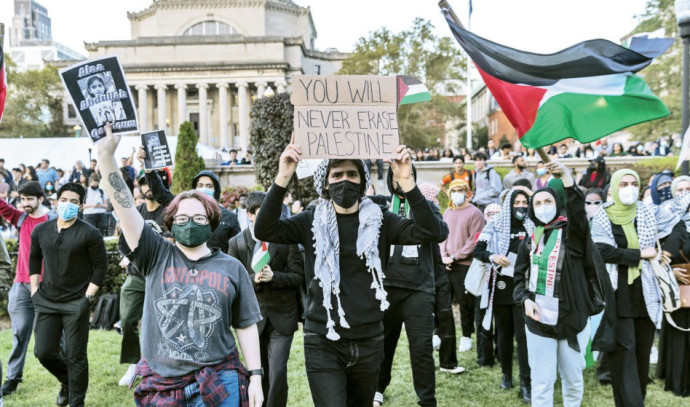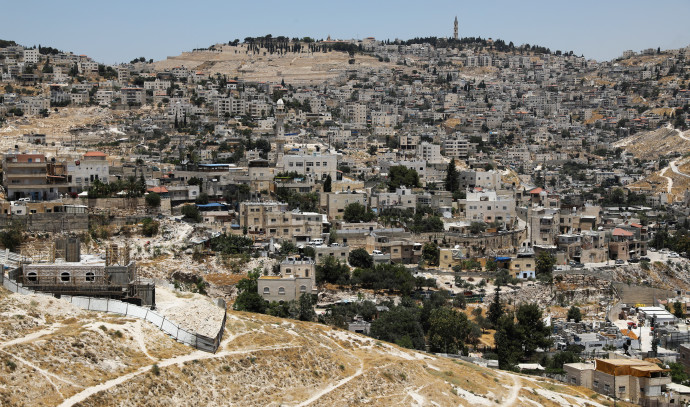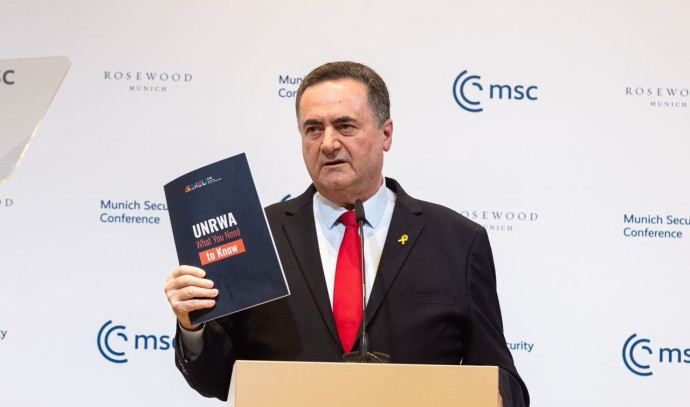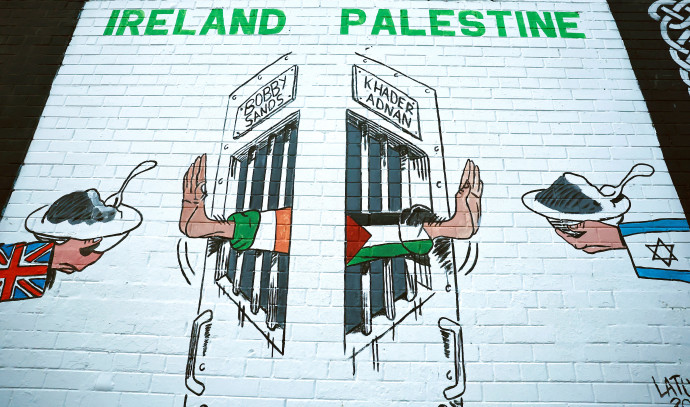world news
Israeli student at Columbia University: “They broke into the building and broke windows”

Udi Segal and Tal Shalev spoke this Wednesday morning on 103FM radio with Omer Lubaton Granot, an Israeli master’s student at Columbia University, who shared his feelings after the widespread pro-Palestinian protests on campus as a reaction to the Israel-Hamas conflict.
“I’m okay, but outside, it’s chaotic like you wouldn’t believe,” he shared, “There are dozens, if not over a hundred, detainees. We are following directions. The students from the protest yesterday broke into the building and shattered windows.”
Despite the chaos, Granot recognized some good things that came out of the campus protests.
“It gave the university a reason to investigate matters they’ve avoided for a long time. There is a lot of criticism about maintaining freedom of expression because it is sacred here, but the students went too far. They closed the campus today. No one could enter.”Lubaton Granot continued, “It’s been disrupting the daily routine here for two weeks already. There are people with covered faces walking around here, waving terrorist flags, shouting ‘Zionists out,’ preventing Israelis from freely walking on campus.”
“At a certain point, we waited for the police to come and take assertive action against them. The president asked the police to stay on campus until May 17. There is a need for constant police presence even though they are not a mob, this is not London, and there are not 100,000 protesters here,” he noted.
“I read in several places, but not sure if it’s confirmed, that among [the protesters] there was a relative of a man who was convicted of terrorism and unrelated to the university. Among the protesters are all sorts of people who are professional provocateurs. But in the end, they are coordinated, inside and out.”
“These are the same organizations where many of their leaders are simply on the outside,” he concluded and said, “There is a sense of personal threat, and we keep looking over our shoulders. We’re careful where we speak Hebrew on campus. We are remaining cautious. Since the beginning of this whole thing, it’s been really scary.
world news
Israel’s High Court rejects petition of east Jerusalem family facing eviction

Israel’s High Court of Justice rejected on Sunday a petition by an east Jerusalem family seeking to challenge a previous court decision – which ruled that the family must vacate their home in Silwan in favor of Jewish residents, the Israeli NGO Peace Now reported.
The Shhadeh family, from Batan al-Hawa in Silwan, challenged Judge Noam Solberg’s ruling, which rejected their appeal request. However, the Shhadeh family claimed that the court did not seek their response to the Jewish buyers’ applications in the case, leading to a flaw in the court’s decision-making process. Their voices were not heard before the decision – contrary to procedural rules.
However, on Sunday, the High Court rejected the petition.
Peace Now, an Israeli NGO working to promote a two-state solution, made a statement on the ruling, saying, “This is a political move, under the guise of legal proceedings, for the forcible displacement of a Palestinian community and its replacement by settlers in the heart of a Palestinian neighborhood in east Jerusalem.”“The responsibility to prevent the injustice lies with the government,” Peace Now added. “It must determine that if settlers have rights to properties from before 1948, they should be compensated for them, not to have the right to evict families who lawfully purchased the property and lived there for decades.”
Currently, all legal paths have reportedly been exhausted, and the family will need to evict its four-floor home by June 1. If they do not leave willingly, the Jewish buyers can file a procedure that would see police forcefully evict residents.
Background on the case
In November 2022, the District Court rejected the Shhadeh family’s appeal and ruled that they must vacate their home. The family then filed a request to appeal to Israel’s High Court. Solberg, the judge who received the case, decided in 2023 to wait for the position of the Attorney General in a similar eviction case.
In the months that passed, while waiting for the Attorney General’s decision, the Jewish buyers’ lawyer submitted six requests to the court to expedite the decision and rule on the case.
Following their sixth request in April 2024, Judge Solberg decided not to wait for the Attorney General’s decision and determined that the family must vacate their home. The family submitted a motion for reconsideration, which was also rejected by the judge. Last week, the family filed a petition to the High Court against the decision, which was rejected on Sunday.
Ateret Cohanim, a right-wing group, was involved in the case and has filed numerous eviction lawsuits against some 84 Palestinian families in Silwan, Peace Now stated. Since 2015, 14 families have been evicted from Batan al-Hawa.
world news
FM Katz severs connection between Spain’s representation in Israel and Palestinians

Israel will bar the Spanish Consulate in Jerusalem from servicing West Bank Palestinians to protest Madrid’s decision this week to unilaterally recognize Palestinian statehood.
“I have decided to sever the connection between Spain’s representation in Israel and the Palestinians,” FM Israel Katz wrote in a post on X on Friday.
Spain has an embassy in Tel Aviv that services Israelis and a consulate located in east Jerusalem that acts as a de facto embassy to the Palestinian Authority.
Most countries similarly split their missions, with an embassy in the Tel Aviv area that services sovereign Israel and a second mission located either in east Jerusalem or Ramallah for West Bank Palestinians.Decision came after recognition of Palestinian statehood
Katz wrote Friday that he would “prohibit the Spanish consulate in Jerusalem from providing services to Palestinians from the West Bank.”
He ordered the measure two days after Spain, Ireland and Norway announced they would unilaterally recognize Palestine as a state, a measure that officially goes into effect on May 28.
The Israeli Foreign Ministry immediately recalled its envoys from those three countries and severely reprimanded the ambassadors of those three countries at a meeting in Jerusalem.
Israel also plans to take additional measures against those three countries. Katz focused in particular on Spain because the country’s Deputy Prime Minister Yolanda Diaz used the phrase “from the River to the Sea Palestine will be free” in a video message this week.
The slogan which calls for the borders of a Palestinian state to stretch from the Jordan River to the Mediterranean Sea, is seen as a call for the elimination of the state of Israel, which is located din that territory.
Katz wrote, “If this ignorant, hate-filled individual wants to understand what radical Islam truly seeks, she should study the 700 years of Islamic rule in Al-Andalus—today’s Spain.”
world news
Ireland & Palestine – A brief history

Ireland is set to announce the recognition of a Palestinian state on Wednesday, following a similar move made hours earlier by Norway. Spanish Prime Minister Pedro Sanchez also plans to announce Spain’s recognition of an independent Palestinian state on the same day. “Today, Ireland, Norway, and Spain are announcing that we recognize the state of Palestine,” said Irish Prime Minister Simon Harris at a press conference. “Each of us will now undertake the necessary national steps to give effect to that decision. I’m confident that further countries will join us in taking this important step in the coming weeks.”
Ireland and Palestine have maintained official relations since 2000, with Ireland establishing a representative office in Ramallah and Palestine maintaining one in Dublin. Both nations are members of the Union for the Mediterranean.
However, the relationship between Ireland and Palestine dates back much further. The Irish nationalist movement has long viewed the Palestinian cause through a similar lens of seeking to overthrow what they see as oppressive colonizers and achieve independent statehood, particularly aligning the Irish Republican Army (IRA) with the Palestinian Liberation Organization (PLO.)By the late 1960s, Ireland grew increasingly concerned about Palestinians displaced by the Six-Day War. In 1969, Irish Foreign Minister Frank Aiken highlighted this issue as a top priority in Ireland’s Middle East policy. Since then, Ireland has supported UN resolutions calling for Israel’s complete withdrawal from the territories captured during the war.
‘IRA-PLO one struggle’
The connection between the Northern Ireland-based IRA and the PLO was most evident in the 1970s and early 1980s, often depicted in murals in nationalist areas. A notable example in Belfast showed armed IRA and PLO members with the slogan “IRA-PLO one struggle.” Sinn Féin linked its political strategy with movements like the ANC and PLO to provide a broader political context for its efforts. This alignment was regularly featured in the Sinn Féin newspaper An Phoblacht and grew stronger under Adams’ leadership in the 1980s.
In 1980, Ireland became the first EU member state to support the establishment of a Palestinian state. In 1999, then-Taoiseach Bertie Ahern visited Gaza, meeting PLO chief Yasser Arafat and touring the Jabaliya refugee camp, becoming the first national leader to fly directly from Palestine to their home country. In 2001, Foreign Affairs Minister Brian Cowen also visited Gaza to meet Arafat.Despite significant support for Palestine within Ireland, the government has yet to implement the 2014 decision to formalize diplomatic relations, preferring a coordinated EU approach. However, in April 2024, Foreign Minister Micheál Martin announced plans to recognize a Palestinian state within weeks.
Former Irish PM Leo Varadkar acknowledged differing views between the US and Ireland regarding the Israel-Hamas conflict, particularly concerning Israeli actions in Gaza.
In 2009, Northern Ireland’s Sinn Féin leader Gerry Adams’ meeting with Hamas highlighted the longstanding ties between Irish Republicanism and Middle Eastern groups. This relationship began in the early 1970s with Libya’s support for the IRA. The IRA’s connections extended to Hezbollah, influencing tactics used in both Lebanon and Northern Ireland. The most enduring relationship was with the PLO, which trained IRA operatives.
Since the official end of the IRA’s armed campaign in 2005, mainstream Republican support for Palestine has been political. While Sinn Féin remains critical of Israel, accusing it of human rights violations, leaders like Gerry Adams publicly adopt a more moderate tone. Sinn Féin calls for EU sanctions against Israel and supports the Palestinian cause through various platforms.
Irish Republicanism’s anti-Israel stance has sometimes been accused of antisemitism. Historically, figures like Arthur Griffith and elements within the IRA expressed antisemitic views. Although overt antisemitism has decreased since the late 1960s, anti-Israel rhetoric sometimes crosses the line, reflecting an underlying historical bias.
Graffiti and murals in Republican areas during the second intifada often glorified Palestinian terrorism, and some Republicans suggested arming Palestinians with decommissioned IRA weapons. While modern Irish Republicanism may not be inherently antisemitic, its century-old undercurrent persists, influencing its stance on Israel and the Jewish people.
In January 2011, Ireland granted diplomatic status to the Palestinian delegation in Dublin. Later that year, Ireland’s Foreign Affairs Minister indicated that the country might lead efforts to recognize Palestinian statehood, contingent on the Palestinian Authority gaining full control over its territories. In 2014, both houses of the Irish Parliament passed motions urging the Government to recognize the State of Palestine.
Today, this has finally come to fruition.
-

 Solar Energy3 years ago
Solar Energy3 years agoDLR testing the use of molten salt in a solar power plant in Portugal
-

 Camera3 years ago
Camera3 years agoCharles ‘Chuck’ Geschke, co-founder of Adobe and inventor of the PDF, dies at 81
-

 TOP SCEINCE2 months ago
TOP SCEINCE2 months agoStellar winds of three sun-like stars detected for the first time
-
world news1 month ago
Jewish diaspora expresses concern as Iranian drones launch toward Israel
-

 TOP SCEINCE2 months ago
TOP SCEINCE2 months agoBrightest gamma-ray burst of all time came from the collapse of a massive star
-

 Solar Energy6 months ago
Solar Energy6 months agoGlencore eyes options on battery recycling project
-
world news6 months ago
Gulf, France aid Gaza, Russia evacuates citizens
-

 TOP SCEINCE2 months ago
TOP SCEINCE2 months agoInherited predisposition for higher muscle strength may protect against common morbidities

